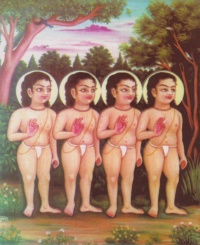Kumaras
Kumara
Kumara (devanāgarī: कुमार kumāra) is a Sanskrit term that refers to a virgin boy, or young celibate. In Hindu mythology it refers to the first four beings created by Brahmā at the beginning of the process of creation from his own mind. The four Kumāras are thus described as the first mind-born sons. Although they were expected to help in the process of creation, they refuse to procreate and instead devote themselves to celibacy and worshipping God. They are said to wander throughout the universe without any desire but with purpose to teach.
In the Theosophical view, the Kumāra is a hierarchy of celestial beings which, as any other hierarchy, involves entities of different degrees of evolution, from Dhyan-Chohans to the reincarnating Egos of human beings.
General description
H. P. Blavatsky wrote in her The Theosophical Glossary:
The first Kumâras are the seven sons of Brahmâ, born out of the limbs of the god, in the so-called ninth creation. It is stated that the name was given to them owing to their formal refusal to “procreate their species”, and so they “remained Yogis”, as the legend says.[1]</blockquot
- ↑ Helena Petrovna Blavatsky, The Theosophical Glossary (Krotona, CA: Theosophical Publishing House, 1973), 182.
